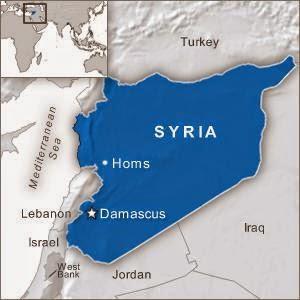
The MIC of US has continually proved that a) he is out of his depth and b) is too arrogant to admit he has no friggin clue what he is doing when it comes to foreign policy matters.
His administration continues to assert that hashtag 'diplomacy' will promote peace and harmony around the world - despite daily deadly evidence to the contrary. Three years on, many hundreds of thousands of dead and displaced Syrians have paid the price for Obama's inability/unwillingness to continue America's historical role of standing up for the oppressed and murdered of our world.
As Obama has drawn, re-drawn and withdrawn 'red lines' matched only by ineffectual words, murdering thugs have killed their fellow countrymen, with impunity, confident that the 'leader of the free world' will do nothing: nothing except give flowery speeches, and wave the now infamous fantasy red crayon around.
Today, Homeland Security News Wire provides what may be the administration's latest mind waffling related to their current ineffectual (non-existent?) response to the madness that continues in Syria:
There is much more detail here, and it is worth the read. I suppose it is a good thing that we are told that MIC's ..."national security team has been reviewing U.S. policy in Syria ...". Better late than never, I guess, even though it is far too late for so many innocent Syrians who will never live to taste freedom. My only prayer is that after this latest 'review' we see a more intelligent, effective policy than either hashtags or red crayons: '...a realistic strategy...' THAT would be change I could believe in. PAY ATTENTION.
U.S. new Syria strategy to seek removal of Assad in parallel with defeat of ISIS13 November 2014
President Barack Obama’s national security team has been reviewing U.S. policy in Syria after concluding that any meaningful progress in the campaign against ISIS, let alone the defeat of the Islamist organization, may not be achievable without being accompanied by a plan to remove President Bashar al Assad from power.
The United States began its air attacks on ISIS in early August as part of an “Iraq first” strategy, the thrust of which has been to emphasize the degradation of ISIS military capabilities in Iraq first, while regarding any operations against ISIS in Syria merely as an effort to influence and shape conditions in Iraq. The administration was hoping that this approach would give the United States time and space to vet, train, and equip an effective moderate Syrian rebel fighting force to take ISIS on. Administration sources now admit that the initial strategy of trying to confront ISIS first in Iraq and then take it on in Syria, without at the same time also focusing on the removal of the Assad clan from power, was a miscalculation which has backfired. The fundamental problem the United States and its Western allies face is that they appear to be willing to use their military might to defend Iran’s allies — the Shi’a regime in Iraq and the Alawite regime in Syria – at the expense of the Sunni majority in Syria and the substantial Sunni minority in Iraq. That perception prompted thousands of Sunni volunteers from around the world to rush to join ISIS ranks, and has led major regional Sunni countries such as Turkey tacitly to support ISIS campaign (the Qatari government, and wealthy individuals in the Gulf States, have been supporting ISIS not so tacitly). Sunnis in the region also note the U.S. apparent acquiescence to three more developments which have enhanced Iran’s sway and influence in the region: the de facto creation of a Shi’a state-within-state in Lebanon under Hezbollah, the takeover last month of Sana’a, Yemen’s capital, by the pro-Iranian Zaydi Shiites from the Houthi clan, and the apparent willingness of the United States to allow Iran to retain a residual nuclear weapons-related capability. The cumulative effect of these developments and perceptions has been to cause the regional Arab anti-ISIS coalition to begin to fray, and calls for formulating a realistic strategy to remove Assad from power to grow louder....


